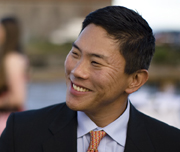August 10, 2009
 |
| Warner Huh. Download image. |
BIRMINGHAM, Ala. - Warner Huh, M.D., a University of Alabama at Birmingham (UAB) gynecologic oncologist and leading cancer-vaccine researcher, is the 2009 recipient of the American Cancer Society Lifesaver Award presented each year by the group's Birmingham office. The award recognizes a medical professional for extraordinary kindness, compassion and excellence as a caregiver.
Huh is an associate professor in the UAB Division of Gynecologic Oncology and an associate scientist in the UAB Comprehensive Cancer Center. He is an expert in minimally invasive robotic surgery and a renowned researcher in human papillomavirus (HPV) vaccines. Huh is a noted leader in the development of women's cancer-screening and -treatment guidelines.
In an award nomination letter on behalf of Huh, the daughter of one of Huh's cancer patients said, "He is much more than a great doctor. He is a remarkable human being."
Huh received his medical degree from Georgetown University in Washington, D.C. He completed residency training at Tufts University in Boston before coming to UAB in 1999. Huh is a fellow in the American College of Obstetricians and Gynecologists and the American College of Surgeons, and he won the 2009 Society of Gynecologic Oncologists Presidential Award.
About the UAB Comprehensive Cancer Center
The UAB Comprehensive Cancer Center is the only one within a five-state region to have the National Cancer Institute's comprehensive designation. The center is a leader in the treatment of women's cancer through its partnership with the UAB Division of Gynecologic Oncology. The Lynn Cohen Clinic at UAB offers a team approach to cancer risk assessment, treatment and survival care.
About the American Cancer Society
The American Cancer Society is dedicated to eliminating cancer as a major health problem by saving lives, diminishing suffering and preventing cancer through research, education, advocacy and service. Founded in 1913 and with national headquarters in Atlanta, the society has 13 regional divisions and local offices in 3,400 communities, including throughout Alabama.